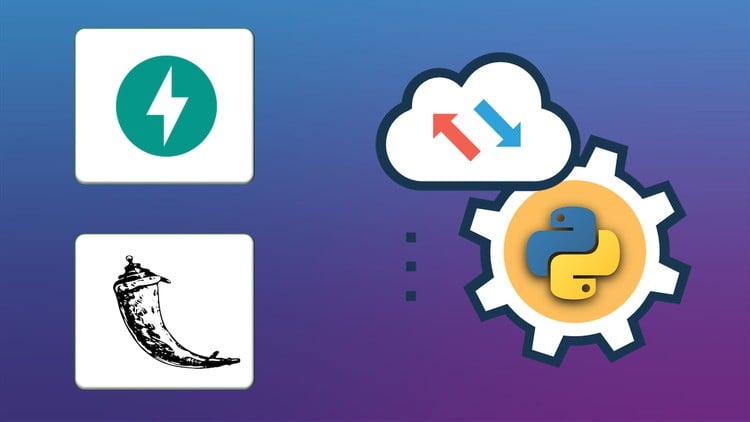
A Comprehensive Guide to Developing, Deploying, and Optimizing Web APIs for Python Developers
⏱️ Length: 3.7 total hours
⭐ 4.23/5 rating
👥 9,223 students
🔄 February 2024 update
Add-On Information:
Note➛ Make sure your 𝐔𝐝𝐞𝐦𝐲 cart has only this course you're going to enroll it now, Remove all other courses from the 𝐔𝐝𝐞𝐦𝐲 cart before Enrolling!
- Course Overview
- Embark on a transformative journey into modern web development, mastering Web API creation with two powerful Python frameworks: FastAPI and Flask. This program moves beyond theory, focusing on practical application to build, deploy, and optimize APIs for real-world scenarios.
- Explore the fundamental role of Application Programming Interfaces (APIs) as the backbone of interconnected digital services. Understand their significance in enabling seamless communication between disparate software components and fostering scalable, modular systems.
- Delve into the distinct advantages and use cases of both FastAPI, known for its blazing performance, asynchronous capabilities, and automatic interactive documentation, and Flask, celebrated for its lightweight, flexible microframework philosophy, ideal for rapid prototyping and granular control.
- This course provides a holistic understanding, progressing from foundational API concepts to advanced development patterns, suitable for newcomers and experienced Pythonistas alike. Learn to design clean, maintainable, and efficient API endpoints adhering to industry best practices.
- Gain insights into the entire API lifecycle: thoughtful design, rigorous testing, secure implementation, and effective deployment strategies, preparing you for professional challenges in an API-driven world.
- Requirements / Prerequisites
- A foundational understanding of Python programming concepts, including data types, control flow, functions, classes, and object-oriented principles, is essential.
- Familiarity with basic web concepts such as the HTTP protocol, request methods (GET, POST, PUT, DELETE), and client-server architecture will provide helpful context.
- Access to a computer with a reliable internet connection and the ability to install Python (version 3.7+) and development tools, preferably Visual Studio Code (VSCode), as utilized in the course.
- No prior experience with API development, FastAPI, or Flask is required. The course guides you from fundamental principles to practical application.
- An eagerness to learn and experiment with backend web development, coupled with a problem-solving mindset, will significantly enhance your learning outcome.
- Skills Covered / Tools Used
- Master the principles of RESTful API design, enabling you to structure endpoints logically, utilize appropriate HTTP methods, and manage resources effectively for optimal interoperability and maintainability.
- Develop expertise in data serialization and deserialization, understanding how to convert Python objects into API-consumable formats like JSON and vice versa for efficient data exchange.
- Implement robust error handling and validation mechanisms within your APIs to gracefully manage unexpected inputs, server-side issues, and provide clear, informative responses.
- Explore fundamental API security considerations, including basic authentication patterns and protecting endpoints from unauthorized access, laying groundwork for advanced security.
- Gain practical experience with FastAPI’s powerful Pydantic integration for data validation and serialization, reducing boilerplate and enhancing API reliability and documentation.
- Utilize Flask-RESTful or similar extensions (conceptually) to streamline the creation of RESTful APIs within the Flask ecosystem, focusing on resource-based routing.
- Understand the deployment landscape for Python web applications, including packaging for production and serving APIs using WSGI (Flask) and ASGI (FastAPI) servers like Gunicorn and Uvicorn.
- Leverage environment variables for managing sensitive configurations and dynamic settings in your API projects, promoting secure and flexible deployment.
- Develop skills in writing clear, self-documenting code and exploring auto-generated API documentation features provided by frameworks like FastAPI.
- Engage with virtual environments to manage project dependencies effectively, ensuring isolation and reproducibility for all your API development projects.
- Benefits / Outcomes
- By course completion, you will possess the ability to independently design, develop, test, and deploy sophisticated Web APIs using both FastAPI and Flask, becoming a versatile Python backend developer.
- Enhance your professional portfolio with practical API projects, demonstrating proficiency in building scalable and efficient web services, crucial for career advancement.
- Gain a profound understanding of how modern applications communicate, empowering you to integrate third-party APIs and build complex, interconnected systems confidently.
- Develop a strong foundation for building microservices architectures, understanding how APIs facilitate modularity, independent deployment, and scalability.
- Improve your problem-solving skills in backend development, learning to debug API issues, optimize performance, and implement best practices for maintainable codebases.
- Position yourself to tackle advanced API topics, including asynchronous API design, advanced security protocols, and specialized deployment strategies, with a solid core understanding.
- Unlock the potential to contribute to a wide range of projects requiring backend services, from web and mobile applications to data processing pipelines.
- Become proficient in choosing the right framework (FastAPI or Flask) for different project requirements, leveraging their unique strengths for optimal solutions.
- PROS
- Dual Framework Focus: Offers a unique advantage by covering two highly relevant Python API frameworks (FastAPI and Flask), broadening your skill set.
- Practical & Project-Oriented: Strong emphasis on hands-on coding and building functional APIs, ensuring direct applicability of learned concepts.
- Up-to-Date Content: Recently updated (February 2024), indicating relevance to current industry practices and framework versions.
- Career Advancement: Equips learners with in-demand skills for backend development roles and strengthens existing Python capabilities.
- Concise Length: Efficient at 3.7 hours, allowing significant skill gain without a lengthy time commitment.
- CONS
- Limited Depth for Advanced Topics: Due to its concise nature, the course might only scratch the surface of highly advanced API security, complex deployment scenarios, or intricate database integrations.
Learning Tracks: English,IT & Software,Other IT & Software
Found It Free? Share It Fast!